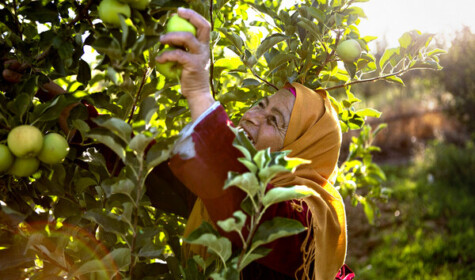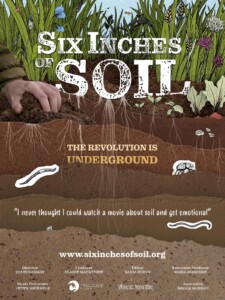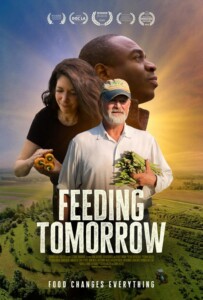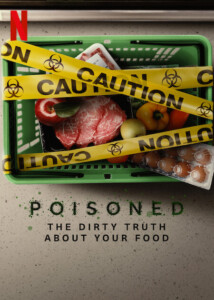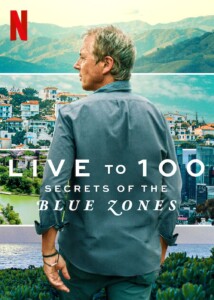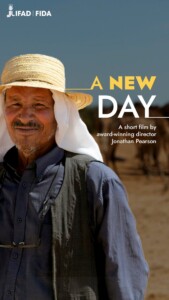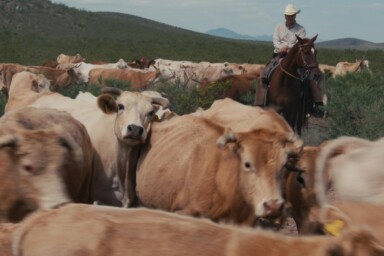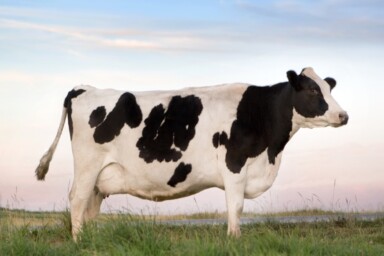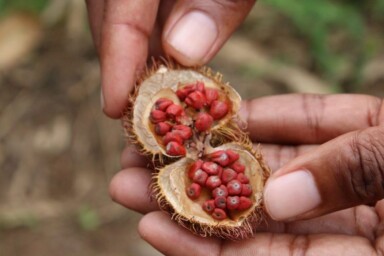Avoid the never-ending scroll on streaming platforms. Our list of recommended food and farming films and TV series is especially selected, watched and reviewed by the SFT team for your viewing pleasure.
Six Inches of Soil
Director: Colin Ramsay
Where to watch: See current screening dates here
There have been so many films – and more to come – on farming, its practices and how to make our food and farming sustainable in the longer term. Six Inches of Soil is one incarnation of this narrative, but what it brings to the table will be more immediate and relevant to a British audience than many previous films of this ilk, which tend to be focused on the US. It follows the stories of three young farmers in the UK: Anna, who left a career as a photographer to come back to the family farm and work with her father; Adrienne, a new entrant farmer looking to grow veg; and Ben, who grew up on a dairy farm, and now raises a herd of Belted Galloways on Bodmin Moor in Cornwall, using regenerative practices.
This is really a story of the next generation and it’s a heartening one. These farmers are working a ‘back to the future’ line – drawing on traditional practices along with new ones like mob grazing. For all three of them, it is all about soil and the importance of its microbiology which is the starting point of fertility and true abundance. The film intersperses explanations of regenerative practices and includes commentary from a range of speakers including Satish Kumar, Tim Lang, Vicky Hird, John Pawsey, Dee Williams and others.
The journeys of these young people are distinct and different. As a new entrant grower with no family background in food production, it is Adrienne who has perhaps the hardest path. Like most farmers, she puts in long hours, working two jobs and making difficult decisions, especially on what to do during the drought of 2022 as her soil loses its vitality. The climate is changing, and this will impact all three farmers over the coming years; what will help them all to thrive is revitalising their land through the conscience and care that they provide it.
Feeding Tomorrow
Co-directors: Oliver English and Simon English
Where to watch: Apple TV/Prime video/Google Play
With the world approaching 10 billion people by 2050, there is an imperative need to change how we feed the world. Feeding Tomorrow looks deeply at what we need to do to transform the way we eat and produce food in ways that will protect the planet and make people healthier.
The film maps the profound problems of industrial farming and its history, but it primarily focuses on change – what do we need to do to improve health and the environment, while increasing food access and security? Farming is in a dire state with a third of farmable land lost across the globe, and industrial food production providing just three things, as grower Rishi Kumar comments, “processed food, junk food and animal food”. Large scale agriculture’s decimation of healthy soil in favour of chemically based nitrogen fertiliser and pesticides, herbicides and fungicides has not been good for us, instead generating only “degeneration and disease”.
The film joins up the dots for a holistic approach to regenerating our food system and at its roots are some simple principles: that there is a relationship between soil health, plant care and human health which should all be essentially interconnected; that diversity is key and variety in what you eat is the essence of a healthy diet; that small-scale farming and localised food production is the way forward in changing our food system.
As farmer Mark Shepherd says, “We need to begin to investigate every aspect of our lives and let’s start with what’s on our plate.”
Poisoned: The Dirty Truth About Your Food
Director: Stephanie Soechtig
Where to watch: Netflix
America is often touted as having the safest food system in the world, but it also has a long history of increasingly dangerous food poisoning events, reaching back several decades. It’s a disturbing side effect of the industrialised food system. Poisoned: The Dirty Truth About Your Food explores the origins and impacts of US outbreaks that continue to this day, despite significant reforms – why does it keep happening?
You can find part of the answer in the bigger picture – the way that food is produced on an industrial scale. Global food systems ship food all over the world – greens grown in California’s Central Valley can be sent to Japan, Taiwan or even Kuwait, which is uncompromisingly crazy. It’s practices like this that may breed the next pandemic.
The other issue here is the production of meat and the growing of vegetables sitting side by side. CAFOs (Concentrated Animal Feeding Operations) are often situated next to or near where huge fields of leafy greens are grown and the possibility of run-off into irrigation canals is common. Produce is often watered with that run-off and increasingly the food poisoning scares are carried by the leafy greens – salad, spinach, lettuces and the like.
The answers are pretty straightforward, but clearly difficult to implement. The relationship between the FDA and the USDA is complicated and opaque – who’s responsible for what? It appears at times that neither really knows. And are these overseers really acting on the behalf of the general public, or are they too much embedded in Big Ag to see the damage or care about it? There’s little here to think that things will change.
Live to 100: Secrets of the Blue Zones
Director: Clay Jeter
Where to watch: Netflix
This four-part series featuring Dan Buettner, a long-distance cyclist who has written extensively on longevity, Live to 100: Secrets of the Blue Zone explores the select few communities across the world that have a high number of centenarians – people who live to 100 or past it.
Starting in Okinawa in Japan, Buettner looks at the diets of Okinawan elders. It is a culture that values food for health and the foods that they eat are full of medicinal properties – purple sweet potatoes, squid ink, particular seaweeds and, of course, tofu, which can lower cholesterol and the risk of heart disease. Another aspect of their diets is how much they eat – just 2000 calories per day as opposed to the 4000 calories that many Americans consume each day. One secret of these elders is that they have gardens where they grow food and, most importantly, because of this, they move and so have retained their core musculature, preserving strength and flexibility.
As Buettner travels the globe to understand what it is that generates longevity, he finds a diverse array of characteristics that go beyond the food that you eat – though a healthy diet remains a constant in the series. In the mountains of Sardinia, steepness has a role to play: in the small villages, people walk up and down all day, and shepherds, often ancient, move constantly as they tend their flocks – this is bound to keep you fit, no matter your age. But also very important, is community. Strong supportive communities like the Seventh-day Adventists in Loma Linda, California, a surprising Blue Zone in the US, foster friendship and happiness, along with their religion, which extends lifetimes.
The secret to longevity isn’t a mystery in the end: eat well, largely plant-based – and don’t forget the wine; quite simply, move – every day and as much as possible; know your purpose; and connect with family and friends.
A New Day Is Possible
Director: Jonathan Pearson
Where to watch: ifad.org
Ifad’s new short film, A New Day Is Possible, is a quick uplifting fix on the joys of farming – something not often celebrated in the face of how tough farming can be. It starts at dawn as farmers start their day, with the powerful voice of Nina Simone singing ‘Feeling Good’ and a series of stunningly beautiful scenes of small-scale farmers in Tunisia.
Two short messages preface the film, so important to remember: “Small scale farmers produce a third of the world’s food” and “They are also on the frontline of climate change” – their importance in the world cannot be diminished and without them food production would falter.
Featured image ©IFAD showing one of the farmers featured in A New Day is Possible.
